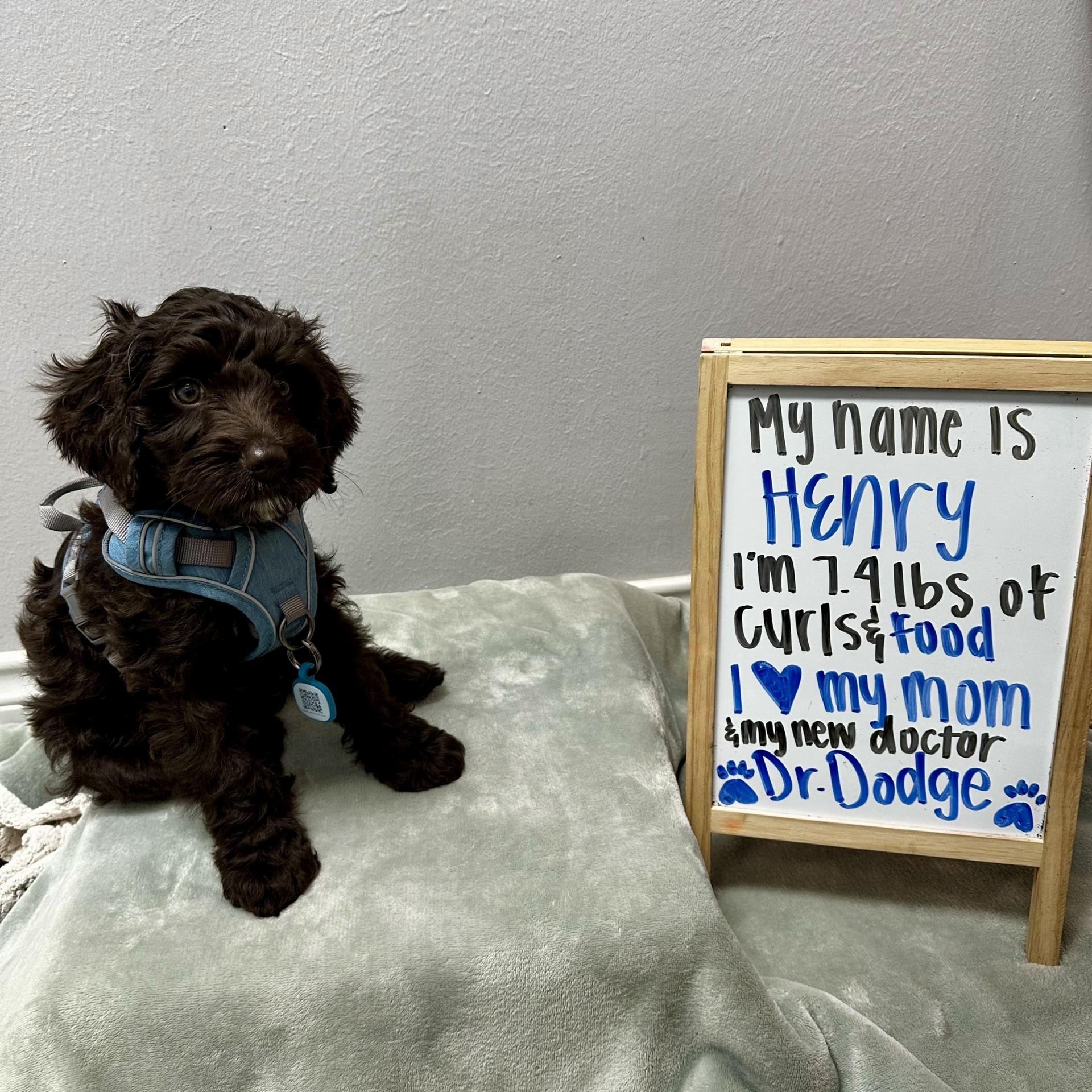Everything You Need to Know About Your New Puppy
 Welcoming a new puppy into your home is an exciting and rewarding experience! This guide will walk you through everything you need to know to start your puppy off on the right paw. From vaccines and parasite prevention to nutrition, training, and knowing when to call your vet, we are here for you at Rice Village Animal Hospital. With proper care and early veterinary attention, your puppy can grow into a happy, healthy adult dog.
Welcoming a new puppy into your home is an exciting and rewarding experience! This guide will walk you through everything you need to know to start your puppy off on the right paw. From vaccines and parasite prevention to nutrition, training, and knowing when to call your vet, we are here for you at Rice Village Animal Hospital. With proper care and early veterinary attention, your puppy can grow into a happy, healthy adult dog.
Puppy Vaccination Schedule
Vaccinations are essential to protect your puppy from serious and potentially life-threatening diseases. Remember, prevention is easier (and cheaper!) than treatment! As an AAHA-accredited hospital, we follow the vaccination guidelines set by the American Animal Hospital Association:
Parasite Prevention & Fecal Exams
Parasite prevention protects your puppy, and your family, from intestinal parasites (roundworms, hookworms, whipworms, tapeworms, and Giardia) and external parasites (fleas, ticks, and mites), and internal parasites like heartworms. Your puppy should start receiving parasite prevention no later than 8 weeks of age. Parasite prevention is to be given year-round for the entirety of your puppy’s life. Your veterinarian will recommend preventatives based on your puppy’s medical history and lifestyle.
Fecal exams are important because many intestinal parasites aren’t visible to the naked eye. Your vet will check for internal parasites by testing a stool sample to ensure your puppy stays parasite-free.
Your Puppy’s First Exam at Rice Village Animal Hospital
At the first veterinary visit, your puppy will receive a complete physical exam to check overall health, identify any birth defects, and start vaccines and parasite prevention. The veterinarian will also discuss nutrition, training, and answer your questions about puppy care. They may also recommend lifestyle changes, environmental accommodations, or anything else to best support your puppy’s life. Bring any previous medical records and a fresh stool sample to your puppy’s first vet appointment.
Nutrition & Feeding Recommendations For Your Puppy
Proper nutrition is vital for your puppy’s growth and development. Choose a high-quality, grain-inclusive puppy food that meets AAFCO standards for your dog’s size and breed. Puppies should not be fed adult dog food, as it is not calorically dense enough and does not accommodate a puppy’s ongoing growth. Puppies should not be fed any human food or other animal food, as this can lead to gastrointestinal problems and malnutrition. Avoid overfeeding by following both the guidelines of your veterinarian and those of the food manufacturers. We are here to help you make the best nutritional decisions and plan for your new puppy.
Puppy Socialization
Socialization and early training are key to raising a confident, well-mannered dog. The goal is to help your puppy learn how to interact calmly and positively with people, animals, and new environments.
Puppy Socialization Basics

- Start early: Begin exposing your puppy to new experiences as early as 7–8 weeks old, once they’ve started their vaccines.
- Positive experiences only: Pair new sights, sounds, and people with treats and praise to create good associations.
- Safe exposure: Carry your puppy in public areas until fully vaccinated, or attend puppy socialization classes in clean, controlled settings.
- Variety matters: Introduce your puppy to people of different ages, other dogs, car rides, grooming, and gentle handling of paws, ears, and mouth.
- Frequency: Aim for 2–3 new experiences per week in short, calm sessions.
Early socialization and gentle, consistent training set the foundation for a well-adjusted adult dog who feels comfortable and secure in a variety of situations!
Health Benefits of Spaying and Neutering Dogs
Spaying (for females) and neutering (for males) are routine surgical procedures that provide lasting health and behavioral benefits for your dog, as well as help reduce pet overpopulation. Your veterinarian will recommend the ideal timing for your puppy’s surgery based on their breed, size, and overall health.
Spaying (Females)
Spaying involves the surgical removal of a female dog’s reproductive organs, including the ovaries and uterus.
Benefits include:
- Prevents heat cycles – Female dogs usually come into heat twice a year. During this time, they may attract male dogs, have bloody discharge, and show behavioral changes such as restlessness or vocalizing. Spaying eliminates these cycles completely.
- Eliminates the risk of uterine infection (pyometra) – Pyometra is a life-threatening infection common in unspayed females, especially as they age. Spaying removes the risk entirely.
- Greatly reduces the risk of mammary (breast) cancer – The risk of mammary tumors drops dramatically if a female is spayed before her first or second heat cycle.
- Prevents unwanted pregnancies – Accidental litters can be costly and difficult to manage, and they contribute to shelter overpopulation.
Neutering (Males)
Neutering is the surgical removal of a male dog’s testicles.
Benefits include:
- Reduces roaming and marking behaviors – Unneutered males often try to escape in search of females in heat, increasing the risk of injury or getting lost. Neutering helps reduce this urge and lessens territorial urine marking indoors.
- Decreases mounting and certain aggression tendencies – While neutering isn’t a cure-all for behavior, it can help reduce hormone-driven behaviors like dominance mounting, fighting with other males, and excessive humping.
- Prevents testicular cancer – Neutering eliminates this risk completely.
- Lowers risk of prostate disease – It helps prevent benign prostatic enlargement, infections, and some prostate-related cancers that can develop in older males.
Puppy Emergencies: When to Call the Vet
Puppies are naturally curious and sometimes get into trouble, so it’s important to know when a situation requires immediate veterinary attention. Because puppies are small and still developing, their condition can worsen quickly. Remember, even minor symptoms can become serious in a short time.
Below are common signs and situations that warrant a call or trip to the vet right away:
Breathing or Consciousness Issues
- Labored, rapid, noisy, or open-mouth breathing
- Gagging, choking, or persistent coughing
- Blue, pale, or gray gums or tongue
- Sudden collapse, weakness, or unresponsiveness
Vomiting, Diarrhea, or Loss of Appetite
- Vomiting or diarrhea lasting more than 24 hours, or occurring multiple times in a day
- Vomit or stool containing blood, worms, or foreign objects
- Refusal to eat or drink for over 24 hours
- Signs of dehydration (dry gums, sunken eyes, lethargy, or skin that doesn’t spring back when gently lifted)
Injuries or Accidents
- Falls from furniture, stairs, or being stepped on
- Limping, crying out when touched, or not bearing weight on a leg
- Bleeding that won’t stop within a few minutes of gentle pressure
- Suspected broken bones or dislocated joints
- Car accidents or any trauma - even if your puppy seems fine afterward, internal injuries can occur
Toxin or Foreign Object Ingestion
If you suspect poisoning, call your veterinarian or the ASPCA Animal Poison Control Center (1-888-426-4435) right away.
- Ingestion of human medication, chocolate, xylitol (found in sugar-free gum and peanut butter), grapes/raisins, onions, garlic, household cleaners, or toxic plants
- Chewing or swallowing toys, socks, bones, or other foreign materials
Urination and Bowel Issues
- Straining or crying when trying to urinate or defecate
- Inability to urinate (especially in male dogs — this can be life-threatening)
- Blood in the urine or stool
Behavioral or Neurological Changes
- Sudden disorientation, pacing, or uncoordinated movements
- Tremors, twitching, or seizures
- Extreme lethargy or difficulty staying awake
- Persistent crying, whining, or restlessness that seems out of character
Swelling, Allergic Reactions, or Bites
- Swelling of the face, muzzle, or eyes (can indicate an allergic reaction)
- Hives or widespread redness/itchiness
- Bee stings, snake bites, or bites from other animals
Temperature and Gum Changes
- Fever (rectal temperature above 103°F) or low body temperature (below 99°F)
- Gums that are pale, white, or bluish rather than healthy pink
- Persistent shivering or panting unrelated to temperature
Scheduling Your Puppy with Rice Village Animal Hospital
We are so excited to meet your new family member and are here to help you navigate through every stage of your puppy's life. Book your puppy’s first appointment today and set them up for a lifetime of good health!
